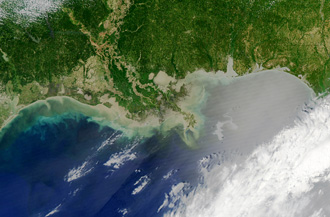$18.7 million funds oil spill-related health work
The Tulane University School of Public Health and Tropical Medicine has received $18.7 million for two major environmental health projects designed to help Gulf Coast residents affected by the 2010 BP Deepwater Horizon oil spill.

This satellite photo of the Gulf Coast, taken in 2010, shows coastal impact of the Deepwater Horizon oil spill. (Photo from NASA)
The Environmental Health Capacity and Literacy Project is a $15 million, five-year Tulane program included in the Gulf Region Health Outreach Program funded through BP's settlement of class action medical claims.
Tulane environmental health faculty, in collaboration with the Association of Occupational and Environmental Clinics, will establish a network of environmental health experts to provide peer consultation and educational resources for primary care physicians in Louisiana, Mississippi, Alabama and Florida.
The project also will strengthen community resilience, training health workers in environmental public health and disaster preparedness and establishing an emerging scholars program at area high schools.
“This project gives us the first comprehensive opportunity to build sustainable environmental health capacity benefitting our vulnerable communities,” says project director Dr. Maureen Lichtveld, Freeport McMoRan Chair of Environmental Policy at Tulane. “We will improve environmental health knowledge and skills at every level from high school to graduate education, while connecting primary care providers with experts in environmental medicine."
The Baton Rouge Area Foundation also awarded Lichtveld a $3.7 million grant from its Fund for the Future of the Gulf for a three-year project to evaluate environmental health risks to seafood and Gulf Coast communities.
The goal is to collect baseline data about seafood consumption and environmental hazards for an accurate risk assessment should another environmental disaster occur. The program will also support training community leaders in environmental public health and disaster preparedness.
“Through the support of the Baton Rouge Area Foundation, we are not only able to address key questions regarding local seafood safety along the Gulf Coast, but will also create a rapidly deployable community outreach, research and education program for residents when they most need it,” Lichtveld says.
